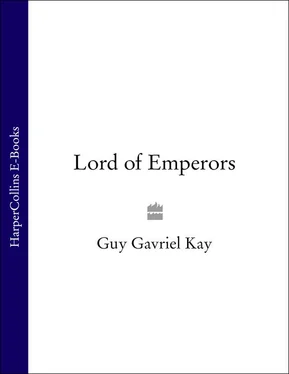1 ...8 9 10 12 13 14 ...32 Later, he was to decide that that long night had given him a new appreciation of the god, if that wasn’t a thought too laden with presumption, for how dare a man such as he speak of appreciating the god? But the thought remained with him: didn’t Jad do something infinitely more difficult each and every night, battling alone against enemies and evil in the bitter cold and dark? And—a further truth—didn’t the god do it for the benefit of others, for his mortal children, and not for himself at all? Pardos had simply been fighting for his own life, not for anything else that lived.
He’d thought, at one point in the darkness after the white moon set, of the Sleepless Ones, those holy clerics who kept a night-long vigil to mark their awareness of what the god did in the night. Then he’d fallen into a fitful, dreamless sleep.
And the very next day, chilled, painfully stiff and very tired, he came to a chapel of those same Sleepless Ones, set back a little from the road, and he entered, gratefully, wanting to pray and give thanks, perhaps find some warmth on a cold, windy morning, and then he saw what was overhead.
One of the clerics was awake and came forward to greet Pardos kindly, and they spoke the sunrise invocation together before the disk and beneath the awesome figure of the dark, bearded god on the dome above. Afterwards, Pardos hesitantly told the cleric that he was from Varena, and a mosaicist, and that the work on the dome was— truly—the most overwhelming he had ever seen.
The white-robed holy man hesitated, in turn, and asked Pardos if he was acquainted with another western mosaicist, a man named Martinian, who had passed this way earlier in the autumn. And Pardos remembered, just in time, that Crispin had travelled east using his partner’s name, and he said yes, he did know Martinian, had done his apprenticeship with him and was journeying east to join him now, in Sarantium.
At that, the thin-faced cleric hesitated a second time and then asked Pardos to wait for him a few moments. He went through a small door at one side of the chapel and returned with another man, older, grey-bearded, and this man explained, awkwardly, that the other artisan, Martinian, had suggested to them that the image of Jad overhead might need a certain measure of . . . attention, if it were to endure as it should.
And Pardos, looking up again, more carefully now, saw what Crispin had seen and nodded his head and said that this was, indeed, so. Then they asked him if he might be willing to assist them in this. Pardos blinked, overawed, and stammered something about the need for a great many tesserae to match those used above for this exacting, almost impossible task. He would require a mosaicist’s equipment and tools, and scaffolding . . .
The two holy men had exchanged a glance and then led Pardos through the chapel to one of the outbuildings behind, and then down some creaking stairs to a cellar. And there, by torchlight, Pardos saw the disassembled parts of scaffolding and the tools of his own trade. There were a dozen chests along the stone walls and the clerics opened these, one by one, and Pardos saw tesserae of such brilliance and quality that he had to struggle not to weep, remembering the muddy, inadequate glass Crispin and Martinian had been forced to use all the time in Varena. These were the tesserae used to make that image of Jad overhead: the clerics had kept them down here, all these hundreds of years.
The two holy men had looked at him, waiting, saying nothing at all, until at length Pardos simply nodded his head. ‘Yes,’ he’d said. ‘Yes.’ And, ‘I will need some of you to help me.’
‘You must teach us what we need to do,’ the older man had said, holding up a torch, looking down at the shining glass in the ancient chests as it reflected and caught the light.
Pardos ended up staying in that place, working among those holy men, living with them, through almost the whole of the winter. It seemed he had been, in the strangest way, expected there.
There came a time when he reached the limits of what he felt capable of doing without guidance or greater experience, putting his own hands to a work of such holy magnificence, and he told the clerics as much. They respected him by then, acknowledged his piety and care, and he even thought they liked him. No one demurred. Wearing a white robe they offered him, Pardos stayed awake with the Sleepless Ones on the last night and, shivering, heard his own name chanted by holy men in their rituals as someone virtuous and deserving, for whom the god’s grace was besought. They gave him gifts—a new cloak, a sun disk—when he set out again with his staff and pack on a bright morning, with birdsong hinting at spring, continuing towards Sarantium.
In all honesty, Rustem had to admit that his vanity had been offended. With the passage of a little more time, he decided, this wounded, unsettled, choleric feeling would probably pass and he might begin to find his wives’ reactions and his own response to be amusing and instructive, but an adequate interval had not yet gone by.
It seemed he had indulged himself in some domestic illusions. He wasn’t the first man to do so. Slender, fragile Jarita, who was being discarded, cast off by the desire of the King of Kings to raise Rustem of Kerakek to the priestly caste, had appeared entirely content when informed of this development—as soon as she was told of the promise that she was to be given an appropriate, kindly husband. Her only request was that this happen in Kabadh.
It seemed that his second, delicate wife, had a greater dislike for desert sand and heat than she had ever revealed, and an equally strong interest in seeing and dwelling within the bustle and excitement of the royal city. Rustem, nonplussed, had indicated that it was likely she could be accommodated in this wish. Jarita had kissed him happily, even passionately, and gone off to see her baby in the nursery.
Katyun, his first wife—calm, composed Katyun, who was being honoured, as was her son, by elevation to the highest of the three castes, with the prospect of unimagined wealth and opportunity—had erupted in a storm of grief upon hearing these same tidings. She had refused to be consoled, wailing and distraught.
Katyun did not have any liking for the great cities of the world, never having seen—or having felt any desire to see—any of them. Sand in clothing or hair was a trivial affliction; the heat of the desert sun could be dealt with if one knew the proper ways to live; small, remote Kerakek was an entirely pleasant place in which to dwell if one were the wife of a respected physician and had the status that came therewith.
Kabadh, the court, the famous water gardens, the churka grounds, the flower-laden, crimson-pillared hall of dance . . . these were places where women would be painted and perfumed and garbed in exquisite silks and in the manners and malice of long practice and familiarity. A woman from the desert provinces among such . . . ?
Katyun had wept in her bed, squeezing her eyes tightly shut, refusing even to look at him, as Rustem strove to comfort her with talk of what opportunities this royal munificence offered for Shaski—and any other children they might now have.
That last had been an impulsive, unplanned comment, but it did produce an ebbing of tears. Katyun wanted another baby and Rustem knew it. With a move to Kabadh, in the lofty role of royal physician, there would be no further arguments about living space or resources that could be applied against the idea of another child.
Inwardly, he had still been wounded, however. Jarita had been much too matter-of-fact about being set aside with her daughter; Katyun gave no evidence of realizing how astonishing this change in their fortunes was, no sign of pride in him, of excitement in their shared new fate.
Читать дальше












